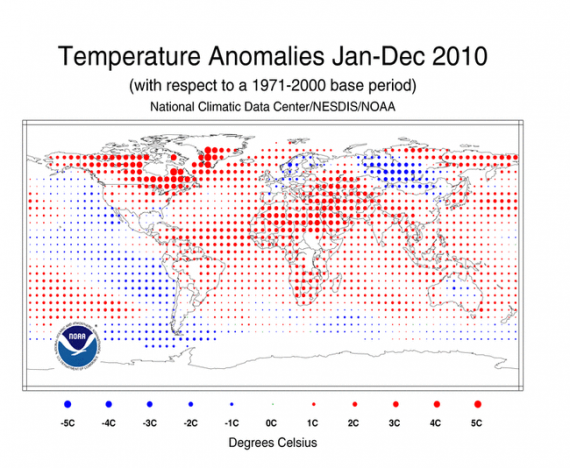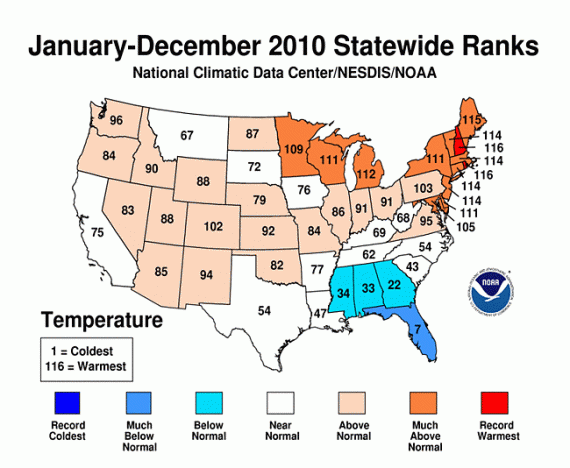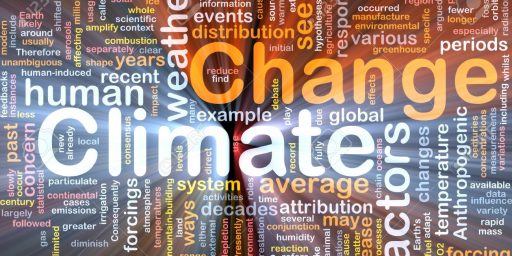2010 Warmest Year on Record
Despite anecdotal evidence debunking global warming, 2010 was another record year for warm temperatures.
Public belief in the cause of global warming (or is that “climate change”?) took a big hit over the last year or so. First, there were leaked reports that some key scientists were fudging the data, hiding evidence that damaged their case. Second, we’ve had two weird winters in a row, with three feet of snow hitting Washington, DC (considered part of “the South” in living memory) and snowfall in 49 of the 50 states yesterday.
But the National Oceanic and Atmospheric Administration reports that, anecdotal evidence notwithstanding, “2010 tied with 2005 as the warmest year of the global surface temperature record, beginning in 1880.” Furthermore, “This was the 34th consecutive year with global temperatures above the 20th century average.” Oh, and even domestically, “For the contiguous United States alone, the 2010 average annual temperature was above normal, resulting in the 23rd warmest year on record.”
Aside from the average temperatures, 2010 was just a pretty weird year weatherwise (and otherwise, but that’s not covered by the NOLA report):
- Combined global land and ocean annual surface temperatures for 2010 tied with 2005 as the warmest such period on record at 1.12 F (0.62 C) above the 20th century average. The range of confidence (to the 95 percent level) associated with the combined surface temperature is +/- 0.13 F (+/- 0.07 C).*
- The global land surface temperatures for 2010 were tied for the second warmest on record at 1.73 F (0.96 C) above the 20th century average. The range of confidence associated with the land surface temperature is +/- 0.20 F (+/- 0.11 C).
- Global ocean surface temperatures for 2010 tied with 2005 as the third warmest on record, at 0.88 F (0.49 C) above the 20th century average. The range of confidence associated with the ocean surface temperature is +/- 0.11 F (+/- 0.06 C).
- In 2010 there was a dramatic shift in the El Niño-Southern Oscillation (ENSO), which influences global temperature and precipitation patterns — when a moderate-to-strong El Niño transitioned to La Niña conditions by July. At the end of November, La Niña was moderate-to-strong.
- According to the Global Historical Climatology Network, 2010 was the wettest year on record, in terms of global average precipitation. As with any year, precipitation patterns were highly variable from region to region.
- The 2010 Pacific hurricane season had seven named storms and three hurricanes, the fewest on record since the mid-1960s when scientists started using satellite observations. By contrast, the Atlantic season was extremely active, with 19 named storms and 12 hurricanes. The year tied for third- and second-most storms and hurricanes on record, respectively.
- The Arctic sea ice extent had a record long growing season, with the annual maximum occurring at the latest date, March 31, since records began in 1979. Despite the shorter-than-normal melting season, the Arctic still reached its third smallest annual sea ice minimum on record behind 2007 and 2008. The Antarctic sea ice extent reached its eighth smallest annual maximum extent in March, while in September, the Antarctic sea ice rapidly expanded to its third largest extent on record.
- A negative Arctic Oscillation (AO) in January and February helped usher in very cold Arctic air to much of the Northern Hemisphere. Record cold and major snowstorms with heavy accumulations occurred across much of eastern North America, Europe and Asia. The February AO index reached -4.266, the largest negative anomaly since records began in 1950.
- From mid-June to mid-August, an unusually strong jet stream shifted northward of western Russia while plunging southward into Pakistan. The jet stream remained locked in place for weeks, bringing an unprecedented two-month heat wave to Russia and contributing to devastating floods in Pakistan at the end of July.
While everyone seems to recall the record snowfall, we seem to forget record hot summers for whatever reasons. Here’s what the United States looked like last year:
So, it was actually ridiculously hot across most of the country last year, with the anomalies coming in the deepest of the Deep South — Mississippi, Alabama, Georgia, and Florida — which were much colder than usual. But that, too, is consistent with the theory.
I don’t claim any especial expertise, even by lay standards, on the climate change issue. My tendency in these sort of matters is to trust the scientific consensus and to pay attention to the public debate with my peripheral vision. I’m still not sure that this isn’t mostly a function of normal variation in nature rather than something caused primarily by man’s modern lifestyle, although I’m pretty sure that we’re a contributing factor. Nor am I sure that we can do much to reverse the trend, much less that the tradeoffs (which, to be meaningful, would hit emerging economies the hardest) are worthwhile.
But we should at least stop pretending that it’s not getting warmer.







So regardless of cause – ‘weather’ its natural phenomina or man made – don’t all sides have a political interest in examining what a warmer planet means for the economy? I think when you study it from that perspective both sides land at the same solution. We need a new energy economy based on alternative sources.
“But we should at least stop pretending that it’s not getting warmer.”
I don’t know that anyone doubts that in a serious way. Of course, there are many people who oppose the concept of global climate change for ideological reasons – they do not really know or care what the reality is, they have political points to make. They will argue against the fact that it is getting warmer, if they can get away with that – or shift to admitting it is getting warmer but denying that CO2 levels in the atmosphere have anything to do with it – or shift to admitting that we are causing the warming, but denying we can do anything about it – or admit we need to do something about it, but insist that the things we do accord with their financial or political interests. A shotgun approach to opposition, none of it serious.
It should be obvious that on an issue like this, one needs to come to grips with what the reality is, and then develop a policy reaction based on that. But the defining feature of the “skeptic” community is the opposite – the policy position comes first, and all the energy is focused on finding ways to spin the reality.
I particularly like all those AGW induced hurricanes we were promised.
Frankly, I can’t rationally trust anything from a government that has so shamelessly politicized science.
“But we should at least stop pretending that it’s not getting warmer.”
OK, so it’s getting warmer. I don’t see anything in that that would indicate pending disaster. In fact, one of the predictions of global warming was that the hurricane seasons would become more destructive. Has anyone noticed that we haven’t had a major hurricane in a couple of years.
The data indicates that 2010 was “above normal” but who is to say what is normal? Perhaps in the grand scheme of things we need to be a few degrees warmer to reach “normal”. Perhaps for the past 100 years or so we have been well below “normal” and are just heading to where we need to be.
Right now I am sitting in the deep south waiting for the temperature to rise above freezing, something it hasn’t done in a few days now. Frankly, I would welcome some more global warming, I am tired of being cold.
But, but…snow! In all states!
It’s hard to go with the consensus of experts when they have been wrong on objective predictions. So they see a temperature rise, something that is suspect when you actually get ahold of their raw data and look at sensor placement. And don’t even think about the idiotic interpolation they do long distances. But just look at the failed predictions of the impacts, such as, no snow for the kiddies to ever see, massive hurricanes as a daily occurrence, etc. These guys may be credentialed, they may have paying jobs to look into the issues but expertise requires some amount of objective success in your analysis and hypotheses.
I’ll believe the “experts” when they produce their data and it is looked at by scientists who work in fields where fudging data gets them prison sentences. Not climatology where blowing hot air get them funding with no accountability.
Did you not read the article? We have had major hurricane, we’ve also had near record numbers of hurricanes and tropical storms. I live in Florida, believe me, I’m aware of them. Thankfully for us, the weather patterns have been such that they mostly turn north far out in the Atlantic, instead of on our coasts or in the gulf.
2010 was a record hear for hurricanes. If the only response skeptics have is “I don’t believe it”, then skeptics have no response.
http://en.wikipedia.org/wiki/2010_Atlantic_hurricane_season
“It’s hard to go with the consensus of experts when they have been wrong on objective predictions.”
Predictions are not objective (not like I think you are contending), just educated guesses. It also depends upon whose predictions you look at. Sensationalized newspaper accounts or journal articles.
Steve
The first warming model was published in 1988 by James Hansen (http://pubs.giss.nasa.gov/abstracts/1988/Hansen_etal.html).
He revisited the model in 2006, based on actual temperature observations. The actual observations showed less than a 5% deviation from the Scenario “B” in the original paper. (http://pubs.giss.nasa.gov/abstracts/2006/Hansen_etal_1.html).
In other words, NASA’s climate models are pretty damned accurate.
The climate story is often framed by liberals, so they say things like “human-caused” and “modern lifestyle”. This is pretty stupid. Those terms are broad, almost anti-human, and accusatory.
Climate disruption is caused not by humans, but by fossil energy. Breathing, burning wood, burning cow flatulence, what have you, is automatically offset. Those things release carbon into the air that was captured in the last few years. Fossil energy, on the other hand, releases carbon that was captured millions of years ago when there was no ice and the only mammals were rodents (or, for young-earthers, never). And of course, fossil energy produces way more CO2 than does any other source, human or natural.
If you or anyone reading believes that 98% of climate scientists are wrong about the causation between fossil fuel CO2 and the energy balance of the earth, with resulting reckless unknown disruption, you need to tell people what they are not seeing. If your gut is telling you they are wrong, you owe it to yourself and God to get a PhD and explore this issue as much as you can.
There is no reviewed paper which calls into question the basic ideas of fossil-caused climate change. There are some who cite papers, and say that those papers disagree with fossil-caused climate change, but when one actually reads those papers, no such thing is said in them. Fossil-caused climate change doubt is *entirely* a PR campaign. It’s been hugely successful because we *want* to believe it.
Fossil energy is the problem. We can easily convert our economy, however. We could invest government money in non-fossil energy. But which? There is nuclear, biofuel, solar, wind, fossil-plus-sequestration. When has government been perfect at picking winners and losers? Markets are better. And where do we get the money? I know it’s an investment that will pay off for the economy in the long run, but who wants to pay now?
The solution is to invest in non-fossil energy, let the people choose which, and don’t make them pay for it. We must fine fossil fuel and give the money back equally. This way, each of use will have a profit motive to invest in non-fossil fuel. Fossil fuel energy prices will rise, but the fine will be given back to all of us equally, so we can pay, on average. As time goes on, and I invest, and you don’t, I will make more money.
If fossil emissions are damaging, this is the most free market, libertarian, and personally responsible solution. It is also an ideal industrial policy to avoid economic crash due to fossil depletion.
Global warming alarmist are not anti-human, anti-modern. They are anti-fossil, anti-old technology. Technology enables our population size and standard of living. The government routinely spurs new technology at the expense of old technology, faster than the market might have otherwise, in order to grow the economy long-term, and increase our standard of living generation after generation.
See carbontax.org, citizensclimatelobby.org, carbon-fees.org, James Hansen, Bloomberg, Laffer, and many more. Various names for this: “Tax Cut/Fossil Fee”, “Carbon Tax Swap”, “Revenue-Neutral Carbon Tax”.
I spend 7 months a year in Florida. There are no shortage of hurricanes. Just because hurricanes don’t reach the level of Katrina or Andrew doesn’t mean they’re not out there.
To think that we’ve not had any hurricanes recently is just ignorant given that 2010 was a record year for the sheer amount of Hurricanes.
Um. Anecdotal evidence doesn’t “debunk” anything. Maybe the subhead could have read: “Despite anecdotal evidence that called into question, for some, the scientific consensus on global warming….”
The hottest year ever? Ever? “Ever”?, EVER?
Let’s deny evolution too while we are at it.
In Kansas we had snow in May last year. The winter was colder than in many previous years and the summer was much milder than many previous years with only a handful of really hot days. I remember summers where being in the hundred and teens were the normal. Yet you expect me to believe that it was above normal. Of course above normal can be in reference to whatever so call “normal” they decide. If it isn’t above normal for a certain set of years then change the set of years.
The map like any data can be manipulated to give whatever appearance those making it want. As JKB has pointed raw data isn’t as supportive of conclusion as the manipulated data is.
They have been caught time and time again of wrongfully manipulated data, wrongfully collecting data, misrepresentation, and pushing an agenda. It is hard to believe anything they say.
Before we know it, Al Gore will release another movie and many of you will point to it again as proof of Global Warming. Oh I forgot it Global Change know since many know the warming charge can’t be sustain.
Obviously from your map, global warming is worse in the blue northeastern states, while sage red state denial actually leads to cooling. Alaska probably wasn’t even cold before Sarah Palin moved there. And that is why it is particularly warm in hell, which of course is only home to liberals.
Isn’t it amazing how often so call “data” changes and it is usually the last year which is in the top list of warmest year. However those years order of being warmest excluding years that fallow drop down the list once they are adjusted once again.
According to the new data published by NASA, 1998 is no longer the hottest year ever. 1934 is. Four of the top 10 years of US CONUS high temperature deviations are now from the 1930s: 1934, 1931, 1938 and 1939, while only 3 of the top 10 are from the last 10 years (1998, 2006, 1999). Several years (2000, 2002, 2003, 2004) fell well down the leaderboard, behind even 1900. (World rankings of temperature are calculated separately.)
http://michellemalkin.com/2007/08/09/hot-news-nasa-fixes-flawed-temperature-data-1998-was-not-the-warmest-year-in-the-millenium/
Before crying about getting information from a conservative site, here is one from NOAA.
http://www.crh.noaa.gov/ilx/climate/ann10p.php
Wayne,
Climate change deals with overall global temperatures, not merely temperatures in the U.S. 2010 is the warmest year on record worldwide — and that’s what matters.
We talk about global temperatures, Wayne gives us a link to the temperature record in Peoria, IL. Did you know that the Earth is bigger than Peoria, Wayne?
When Wayne talks about 1934 being the hottest year, does he realize that the difference between 1934 and 1998 is a matter of 2/100 of a degree? This is a statistically insignificant difference, making the two years’ global temperatures basically a tie. Also, those are just for US temperatures. Again, we are talking about global temperatures.
Does Wayne know that globally, nine of the warmest years were in the last decade, and the tenth was 1998?
Isn’t it amazing how often so call “data” changes and it is usually the last year which is in the top list of warmest year
It’s not amazing, because it’s not true. 2009 was not the warmest year, and 2008 isn’t even in the top ten. However, the fact that recent years have mostly made the top ten is amazing, because the globe is warming at an alarming rate.
Alex
Then why put a temperature map up of the U.S. ?
Mantis
My bad on the NOAA link. That still doesn’t change the rest. It is no wonder with Hansen in charge. I bet in the next decade that they will make “adjustments” downward on this decade’s numbers.
http://www.climate-skeptic.com/temperature_history/
My bad on the NOAA link.
Yes, and you responded by linking to a website of a guy with a bachelor’s in mechanical engineering and an MBA. Thanks, but I’ll stick with academics and professionals in climate sciences.
That still doesn’t change the rest.
The rest of what? You’re misunderstandings of the difference between the Earth and one country?
It is no wonder with Hansen in charge.
Hansen is in charge of the NASA Goddard Institute for Space Studies, not the NOAA.
I bet in the next decade that they will make “adjustments” downward on this decade’s numbers.
Do you base this on your depth of knowledge of climate science, or your hatred of Al Gore? I bet I know which is true.
Re “You’re misunderstandings of the difference between the Earth and one country?
You may want to tell James that. He is the one that used a map of one country to help prove the global warming B.S.
I am surprise no one jump on my use of personal experience. Something along the line of “you know Kansas isn’t the whole world stuff”. My point is the hypocrisy of some. If someone experience in Florida or use of one country supports your agenda, you have no problem with it. If someone does it in refute to your agenda then they are idiots. Once again double standards.
I am always suspicious of those giving opinions when they have a good deal of financial interest at stake. I have a suspicion you would also if it was say a tobacco or oil company releasing studies in their field in which you disagree with. As has been spelled out in other threads, Climate scientists have a big big financial interest in promoting global warming.
You may want to tell James that. He is the one that used a map of one country to help prove the global warming B.S.
He did not use the map to prove anything. When you stop lying, people might take you seriously.
Climate scientists have a big big financial interest in promoting global warming.
Just because you read it on the internet, doesn’t mean its true. I know climate scientists. My guess is you’ve never met one. They are not making any more money than other academics and professional scientists in many, many other fields. The energy industry funded denialists have invented an absurd alternate reality where climate scientists are raking in the bucks selling lies. They aren’t. It’s a lie.
Kevin Trenberth says: “The fact is that we can’t account for the lack of warming at the moment and it is a travesty that we can’t.”
@Wayne
“I am surprise no one jump on my use of personal experience. Something along the line of “you know Kansas isn’t the whole world stuff”. ”
Well, how’s this. Your use of local data to disprove a global phenomenon reminds me of Bernard Shaw’s definition of a barbarian: That’s somebody who thinks the local customs are laws of nature.
“As has been spelled out in other threads, Climate scientists have a big big financial interest in promoting global warming.”
Sure, because professors live and die based on whether their theories are accepted. Its too bad they don’t have something like tenure.
Whatever else might be true or false about global warming, this one is just wrong. Most climate scientists in the world are tenured professors at universities; their paychecks are assured, and they make no money from having their papers published. Now if you’d said they have a big prestige influence then you might have a case – every scientist (like everyone in every field) wants to be the one who’s theories are accepted.
John,
In the particular email from which you quote, Trenberth is discussing the difficulties of tracking heat flows in the deep ocean. In the interest of fairness, why didn’t you post the email in its entirety rather than one little snippet? If Global Warming is a fraud, why would you need to deliberately take a quote out of context?
So from 2005 to 2010 the temperature stayed the same. But it’s getting warmer. Ok.
The earth has been much hotter than this in the past, and much colder. I don’t have as many problems with predictions of the earth getting warmer or even the earth is getting warmer as I do with most of the policy prescriptions for trying to address it. Well, that, and boondoggles for Climate Change conferences in Cancun. As Glenn Reynolds like to say, I’ll believe there’s a global warming crisis when they start acting like there’s a global warming crisis. On the other hand, I know there’s a deficit spending problem even if they won’t acknowledge it or act like it. What are you gonna do? But I digress.
So from 2005 to 2010 the temperature stayed the same. But it’s getting warmer. Ok.
If you’re going to prove yourself completely stupid with the first sentence, why write any more than that? There is no point.
Many of the hottest years on record were back in the 1930’s. Does that prove anything? No. Neither does last year being the hottest since…how far do those records go back? Medieval warming period included? Mann conveniently left that out as well.
We more and longer study of this. Is it the sun? Is it natural cycles? The whole tipping point argument pulled the rug of credibility out from under this years ago.
Steve,
The warmest years globally were not in the 1930’s. 1934 was a record year only for the United States.
“Is it the sun? Is it natural cycles”? No Steve, we know it’s not the sun, because solar activity has been flat since the 1950’s. We know it’s not “natural cycles” because the only cycle that could have impact would be Milankovich Cycles, and we’re at a point in the current MC where we should be seeing cooling. There is nothing which can explain the current warming other than CO2.
Ben, With due respect I’m reading an awful lot that contradicts what you’re saying. That’s kind of the problem with this branch of “science”. There are so many competing and contradictory views we can’t formulate policy with any confidence. Until we have that we should not take steps that would destroy the economy.
Steve,
You can see here that the sun has been in it’s deepest minimum for nearly a century:
http://science.nasa.gov/science-news/science-at-nasa/2009/01apr_deepsolarminimum/
You can watch an entertaining video regarding Milankovitch Cycles here:
http://www.skepticalscience.com/How-to-explain-Milankovitch-cycles-to-a-hostile-Congressman-in-30-seconds.html
We’ve spent seventy years investigating possible causes of climate change. Everything but CO2 has been eliminated. Indeed, what ultimately makes the skeptic case so weak is that no one has suggested an alternative to CO2 that fits the observations.